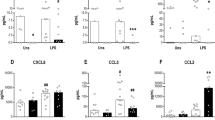Abstract
The n-3 and n-6 polyunsaturated fatty acids (PUFAs) are essential dietary constituents. They are potent modulators of the human immune response, and research has endeavoured to optimise the ratio of n-3 to n-6 fatty acids in the lipid emulsion component of total parenteral nutrition to harness their beneficial effects in the clinical setting. PUFAs modulate apoptosis of certain tumour cells and cell lines. Monocytes, which are major effector cells of the innate immune system, play a central role in the initiation, development, and outcome of the immune response. They are crucial in the defence against invading pathogens and are involved in the lysis of infected or malignant cells, wound healing, repair, and remodelling of tissues. In the present study we investigated whether PUFAs might evoke apoptosis in newborn monocytes. Purified cord-blood monocytes collected from uncomplicated full-term pregnancies were incubated for 24 h in complete medium in the presence or absence of one of the n-3 PUFAs docosahexaenoic acid (DHA) and eicosapentaenoic (EPA) or the n-6 PUFA arachidonic acid (AA). Following incubation, cells were triple-labelled with annexin V, CD14, and propidium iodide prior to flow-cytometric analysis to determine the degree of cell death. All experiments were performed in triplicate and data expressed as mean ±1 S.D. (%). In the absence of fatty acids, 30 ± 4% of control cord monocytes underwent apoptosis or necrosis after 24 h incubation. At a concentration of 50 μM, none of the PUFAs had a significant effect on monocyte cell death, but at a dose of 100 μM, DHA resulted in 60 ± 4% cell death (P < 0.05) while the other PUFAs had no significant effect. In contrast, at higher concentrations (200 μM), all the PUFAs significantly increased monocyte cell death (AA: 70 ± 5%, DHA: 86 ± 2%, EPA: 70 ± 4%). PUFAs thus exert a potent influence on cord monocyte cell survival in vitro. Their effect is dose-dependent and DHA appears to be the most potent of the fatty acids tested. The influence of PUFAs on neonatal monocyte-cell survival suggests a novel mechanism whereby PUFAs may modulate the immune response.
Similar content being viewed by others
Author information
Authors and Affiliations
Rights and permissions
About this article
Cite this article
Sweeney, B., Puri, P. & Reen, D. Polyunsaturated fatty acids influence neonatal monocyte survival. Pediatr Surg Int 17, 254–258 (2001). https://doi.org/10.1007/s003830100589
Issue Date:
DOI: https://doi.org/10.1007/s003830100589




